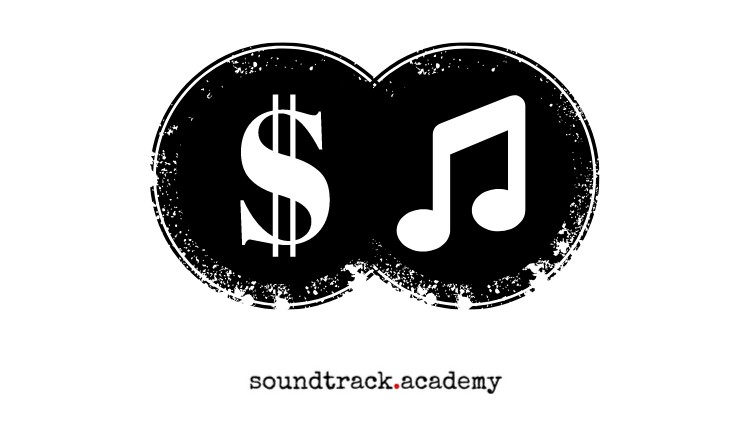Monetise Your Music - How To Make Money With Music
- Description
- Curriculum
- FAQ
- Reviews
- Grade

You’re a composer / producer that can write high quality music that sounds polished.
What if you could learn how to make money with music?
And not only to make a bit of cash on the side, but what if you could transform that music into a music business, providing you a full-time income?
That would be pretty life-changing, right?
Well, I’m here to tell you all about the library music industry, and how you can build a portfolio of tracks that will sell consistently and bring you the pride and satisfaction of making money from your music.
And depending on your own goals, level, and ability, the amount you earn from your music can be anything from a few dollars a month to pay for a cinema ticket, right the way through to you having a fully-fledged music business with a full 6-figure income.
The best part is, a lot of that income comes passively from tracks in your catalogue!
In this music business course on how to make money with music, you’re going to learn:
-
About the library music business models, which ones you should write for, and how to maximise your success in each model
-
The best ways to make your music perfect for stock music libraries, and how to optimise sales
-
How to write great titles, tags, and descriptions that help you rank in music libraries
-
How to approach music publishers to give yourself the best chance of signing with a premium library, and also how register and upload your music to online marketplaces to sell stock music, and make money online
By the end of the course you’re going have a thorough understanding of how the library music industry works and where your money comes from. I’ll also share with you my top advice on how to make your music best work in a music library, and how to maximise how much money you can earn from your music.
This really is a complete guide to the library music business, and we’re going to go in-depth into the non-exclusive, royalty-free libraries as well as the more premium music publishers.
So whether you’re fairly new to composition, or whether you’ve years of experience under your belt – I’m going to show you exactly how to get started and where to focus your efforts depending on your level.
And don’t think that just because you’re fairly new to music composition or production that this isn’t an option for you.
That’s not true at all – we all have to start somewhere, and the earlier you start trying to make money from your music, the sooner you’ll learn what works and what doesn’t, and with my guidance you’ll be headed in the right direction right from the get go.
As well as the main video lectures in the course I’ve also put together for you:
-
A list of all the major music libraries and publishers in the music industry that you can contact and register your music with – including both premium, exclusive libraries and non-exclusive royalty-free ones (where you can make money online by selling stock music)
-
My checklist for stock music composition so that you remember exactly what steps you need to go through to create successful, sellable library music pieces – perfectly tailored to the library music industry
-
A collection of email templates for reaching out to music supervisors, A&R reps, and music library owners, to help you get signed with a reputable music publisher and start earning those coveted performance and broadcast royalties – the first step towards turning your hobby into a music business!
You’ll also get a copy of my eBook, “The Media Scoring Guide”, that takes you through all of the skills and equipment that you’ll need to get started, as well as the process of composing music for media.
And on top of all that, you’ll be invited to join my closed group of composers and producers where you can get advice and feedback from me and other music industry professionals that are in the group, as well as from your peers going through the same journey as you.
As with all of my courses you’re protected by a 30-day money back guarantee – no hard feelings, I completely understand that sometimes things just aren’t what you expect – so you’ve really nothing to lose.
Hit the “buy now” button and start your journey towards making money from your music today!
A final note before I leave you to finish signing up, I can’t guarantee that you’ll make money from your music, no one can, and if anyone does promise you that, they’re lying to you – unless they’re literally standing there with a wad of money about to buy some music from you!
Whether or not you make money from your music depends on your ability, goals, and how seriously you take action on the lessons in the course. I can tell you that if you follow my advice, implement my teaching, and, most importantly, take action, then you’ll stand a much greater chance of success than without.
So click on the “buy now” button, and I’ll see you ready to take action inside the course.
-
1Introduction & What To Expect
Welcome to the course! This is a brief overview of what to expect, and what's included in this course on how to make money with music.
I’m so happy that you’re here and ready to take action in order to start making some money from your music!
What better feeling could there be than expressing yourself creatively and musically and getting paid for it? I promise that the day you make your first sale you’re going to feel so validated as a composer. Nothing beats that feeling!
The course is going to introduce you to the world of library and production music. We’re going to talk about the various library music business models and deals that you’ll need to look out for, where your money actually comes from, what music libraries want from you, how to approach market research to decide where to focus your efforts and how to title and tag your music, and I’m also going to show you exactly how to get setup on a couple of popular online marketplaces and also how to approach music publishers when the time comes for you to really up your game and start building your composing work into a proper career.
-
2How To Make Money With Music - The Stock Music Model
Here's the big picture. This video will get you setup with everything you need to know about the library music industry, where the money comes from, and what type of music you should be writing - a quick start" guide to earn money from music!
This is the essential stuff you need to know to make money with your music business by selling stock music.. I’m going to go through exactly what stock music is, where the money comes from, the types of libraries, what a good library music track sounds like, how to use titles and keywords, some technicalities of submitting tracks, and we’ll talk about which libraries you should actually write for.
Stock music, library music, production music, background music, whatever you choose to call it, sometimes get scoffed at by composers, as it can be seen as lower quality, generic, boring music.
But that’s not the case at all!
In fact, some library music can be some of the most creative, inventive, and incredibly well made music around - it has to be, if it’s going to get placed on programs or adverts that are going to be broadcast nationwide, and even internationally.
It can also be a really great way for you to make a living as a composer, offering you a great income, the ability to manage your own time and work output without the pressures of tight deadlines that you might find when working on bespoke projects, while still being able to be creative and, at the end of the day, to make money with music - something you love creating!
And the best part is that regardless of where you’re at in your composing journey, there’s probably a suitable platform for you to start with. Although I’ve said that some library music is some of the best produced music around, there’s also a whole world of more budget library music tracks that still need to be good, but can be great avenue for you to practice with, and make a bit of cash from.
-
3Join the Facebook Community!
-
4The Three Tiers of Music Libraries
Music libraries come in all shapes and sizes, covering all areas of the film and music industry. Here are the main types of libraries, their music business models, and how you can make money from each.
Wherever you’re at in your composing journey, there are libraries where you can submit your music. Sure, if you’re a total beginner it’s not likely that you’ll get tracks featured by any of the absolute top-tier libraries, but that doesn’t mean that you can’t make some money from your music.
There’s a whole spread of libraries from ones that focus on music for big blockbuster Hollywood trailers, to ones that are aimed towards hobbyist content creators, like YouTubers.
It should go without saying that to have success with libraries even at what you might consider the “lower end” of the spectrum, your music still needs to be of a really high quality - but with the tips you’ll learn in this video you’ll get a better idea of what each library’s purpose is, and how you can best learn to work with each tier of music library.
I’ve put together a list of many of the music libraries that you can become an artist with or submit your music to - you can download that as a resource on this video. It’s a very comprehensive list covering the main libraries, but of course it doesn’t have all of the libraries on there!
Likewise, I don’t have personal experience with every library, it would be far too much to handle to be involved with every single one, but I urge you to browse through the libraries and see what kind of music they have, and whether any are more in line with the type of stuff you’re creating than others.
-
5Types of Library Music Business Deals
In the music industry, you need to be really careful with the different music business models and contracts. This video covers the types of deals you can expect, and how to make money from your music with each type of deal.
There are many different deals when it comes to library music, and there’s no “best” deal. Depending on the type of music you’re creating, the type of library, and your own personal feelings about your music, you have different options that can all work out in your favour…or against you!
One thing is for certain though : you need to know what you’re signing up for. And don’t take someone’s word for it, always read the terms yourself, and make sure you understand everything clearly.
-
6Stock Music Revenue Streams - Where Does Your Money Come From?
Where does the money come from? This video reveals all! This is how the library music industry helps makes money from your music, and how that money gets back to you.
Knowing where, when, and how your money is coming to you is really important - it not only helps you understand who’s paying you and when you can expect to be paid, but knowing the business models will help you make better choices for the long term, and not just base your decisions on instant gratification.
-
7How Music Libraries Work & The Keys To Your Success
In this video you are going to learn how to rank in royalty-free music libraries, and exactly what stock music libraries are looking for from you in order to convince them to focus more attention on promoting your music. Do this right, and you'll be in a much stronger position to make money from your music.
If you know how stock music libraries measure the saleability of your work, you’ll not only be able to compose more sellable music, but you’ll also know how to best title, tag, and target your music too.
The number one thing to remember about selling your music through stock music libraries - whether that’s the big, royalty-free online portals, or via exclusive publishing companies - is that your success is, ultimately, their success.
I don’t mean in that in a sentimental or developmental way, I mean it financially - if you’re making money, they’re making money. That's how the music business works!
So you just have to prove to them that what you’re offering will indeed make them money.
-
8Market Research - What Type Of Music To Write
In this video we’re going to look at exactly how to work out what type of music you should be composing for stock music libraries.
It would be lovely if you could just write whatever music you felt like, submit it to some libraries, and make your living. Trust me, I know that’s the dream for so many of you.
But in reality, you need to be writing music in certain styles and moods that work for the people looking to buy your music - your clients. At the end of the day, it's a music business!
The real trick is to learn to be inspired by all kinds of music. And that’s hard : particularly in music that is so full of opinions and subjectivity. Telling a heavy metaller that they need to listen to and enjoy the music of Justin Bieber is a tough sell - and I know, because I used to be a devout metalhead. The truth? I still love heavy metal, I’m just also open to every other genre too, and I can find stuff I love in pretty much anything.
So believe me when I say : if you can open your mind and ears to a wider variety of music, and learn to find the joy in any piece of music, you’ll be giving yourself a much easier time when it comes to writing library music.
I’m not saying that you shouldn’t find your niche, or figure out your strengths - not at all. In fact, figuring out both of those is so important to both your success and happiness. All I’m saying is that you also need to figure out what people want, and how to you can build that into what you’re creating. Basically, you need to find your place in the music industry.
Once you've done that, you'll not only make money from your music, but you'll also be fulfilled creatively.
-
9Title & Tagging - Using Keywords To Optimise Your Results
We’re going to talk about how to title your tracks, and how to choose the best tags and keywords to make sure you’re showing up in search results.
So you’ve learned how to write on trend music by following global music industry trends, and you’re able to produce your tracks to a high quality quickly. That’s great, but it’s also worthless is people can’t actually find your music when they’re searching with keywords.
A keyword is what someone puts in when they’re using a search engine. So if a filmmaker was creating a corporate training video for a client, they might hop onto AudioJungle and search for “corporate training” or “training video” - or if a music editor for a TV documentary was looking for music to go over a tragic scene they might search with the keywords “sad” or “emotional”
And what you’re hoping to do is to have your music pop up at the top of the search results when someone uses those keywords. The higher you rank, the more money you'll make.
-
10How To Compose Successful Library Music
Writing good music isn't the only key to success in the music industry - you also need to know how to tailer your music to best fit with the library music business models.
This video is all about how to compose library music, including my top tips on what makes a successful stock music track.
It’s all well and good knowing how to target your audience, get the right keywords and tags, sort all of the cutdowns and edits of your tracks, and get them uploaded, but you still need to know exactly what makes a stock music track successful.
I’m working off the assumption that already know how to compose a piece of music, and that you’re already capable of writing music that meets a certain style or brief. A big part of creating successful stock music is getting that brief right in the first place, which you’re often doing yourself if you’re working with royalty-free libraries.
So with that said, these tips are more about how to tailor your music to the stock music world, as opposed to how to actually compose a piece from scratch.
-
11Cutdowns & What To Submit To Music Libraries
In this lesson you’re going to learn about all of the different versions you need to create of a single track, including loops, stings, bumpers, bubbles, and beds. If that sounded like gobbledegook to you, don’t worry, explanations are coming up!
One of the things you need to remember about library music, is that it’s rarely going to be used in its original form in its entirety. If your original composition is two minutes long, but it needs to fit on a video ad that’s only 30 seconds, then it’s obviously going to be cutdown.
If you can provide various cutdown versions of your music, and more parts for someone to work with, you’re making your music more versatile, more usable, and, ultimately, more sellable. So really, these "technicalities" are actually essential for you to earn money from music.
So here's what you need to include!
-
12How To Register With & Upload Tracks to AudioJungle
AudioJungle is one of the biggest royalty-free libraries in the music industry. They accept music in all kinds of genres, and even some at a lower quality than other library music businesses. That makes them a great place to start if you're new to the library music game.
This video takes you through exactly how to register and upload your music to AudioJungle.
-
13How To Create Amazing Thumbnails - The Easy Way!
Good music is one thing, but how about a good thumbnail? Here's the easiest way to create eye-catching thumbnails for your library music tracks. And the best part? It's free!
-
14How To Sign With A Music Publisher & Take Your Music Business To The Next Level
In this video I’m going to take you through the five steps to take things to the next level and begin working with more exclusive music publishers.
As we’ve talked about, the best way to make a living from library music is to diversify where you income comes from, and signing with an exclusive publisher is a great way to start building up your recurring performance royalties, that you don’t really get from royalty-free libraries. This is your first step towards turning your hobby into a fully fledge music business with a full-time income.
Remember, with a healthy catalogue of library music tracks signed to a good publisher and getting regular placements, you could be making over $100,000 a year from performance royalties alone. That's a seriously good way of making money from your music!
But how do you actually get to work with these libraries? How do you make the right contacts in the music industry?
Well, sadly, it’s not as easy as visiting their website and registering, like you do with AudioJungle or Pond5. It’s not even as easy as clicking on the “contact us” link and emailing your showreel - although it would be great if it was!
The easiest way to start working with any of these libraries is either through a referral from another composer, or from personal outreach to a decision maker - that is, someone who can actually sign you up, not just someone on the customer service helpline.











